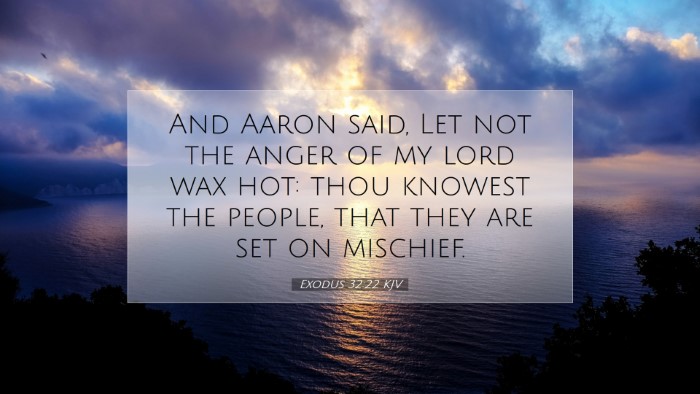Commentary on Exodus 32:22
Verse Reference: Exodus 32:22 - "And Aaron said, 'Let not the anger of my lord wax hot: thou knowest the people, that they are set on mischief.'
Introduction
This verse comes in a crucial narrative within the Book of Exodus, following the incident of the Golden Calf. Aaron, the high priest and brother of Moses, responds to Moses’ inquiry about the idolatrous behavior of the Israelites. His response is significant for understanding the human tendency towards sin and the challenge of leadership.
Insights From Public Domain Commentaries
Matthew Henry's Commentary
Acknowledgment of the Situation: Matthew Henry notes that Aaron’s plea reflects a common human reality, highlighting how pressures can lead leaders to make poor decisions. He emphasizes the idea of Aaron attempting to soften Moses' wrath, indicating Aaron’s awareness of his brother's justifiable anger.
Human Nature and Misbehavior: Henry also points out the collective nature of sin within the community, where Aaron acknowledges "the people" as being inclined towards mischief. This suggests that societal influences can challenge individual integrity and morality.
Albert Barnes' Commentary
Contextual Understanding: Albert Barnes provides context by explaining that Aaron’s statement serves to deflect blame from himself. He acknowledges the "mischief" that the people are set on as a way to rationalize his failure to lead them properly. Barnes highlights the failure of leadership as central to the narrative.
The Role of Leadership: Barnes argues that Aaron’s lack of moral fortitude in confronting the people's sin underscores a critical aspect of peership; those in leadership must steadfastly hold the line against collective sin rather than capitulate to popular pressure.
Adam Clarke's Commentary
Examination of Leadership Failure: Adam Clarke elaborates on the dynamics of leadership, acknowledging that Aaron's response demonstrates a faltering moral courage. Clarke reflects on the role of a leader in standing firm amidst turbulent spiritual conditions.
Psychological Insight: Clarke further interprets Aaron’s construction of the narrative around the people's behavior as indicative of a psychological mechanism to alleviate personal guilt. By framing the actions of the Israelites within the context of their 'mischief', Aaron distances himself from the consequences of their idolatry.
Theological Themes
- Leadership Responsibility:
The role of a leader is not merely administrative but also moral and spiritual. This passage reflects the burdens carried by leaders, illustrating how they are often caught between guiding their people and addressing their failings.
- Human Nature:
The innate disposition of humanity towards rebellion against God is clear in this narrative. The people's readiness to revert to idolatry after witnessing God's miracles reveals a persistent struggle with faithfulness that echoes throughout Scripture.
- Divine Justice and Mercy:
This episode also illustrates the tension between divine justice and mercy. Though anger is rightfully directed towards Israel's idolatry, the subsequent intercession plea highlights that God’s mercy can prevail in moments of human failure.
Application for Today's Believers
As believers reflect on Exodus 32:22, several practical lessons emerge:
- The Need for Courageous Leadership:
Leaders in faith communities must navigate the complexities of moral challenges with courage, ensuring they stand firm against popular dissent.
- Understanding Collective Sin:
Recognizing the dynamics of collective behavior can empower communities to confront sinful practices and foster accountability.
- The Importance of Intercession:
Believers are called to intercede for others, whether they be leaders or the community. Understanding sin’s impact on individuals and groups reminds us of the need for prayerful intercession.
Conclusion
Exodus 32:22 presents a profound moment that encapsulates issues of leadership, the nature of sin, and the need for moral courage. The commentaries of Matthew Henry, Albert Barnes, and Adam Clarke collectively deepen our understanding, pushing us toward thoughtful application and greater awareness of how ancient texts speak to contemporary faith challenges.


